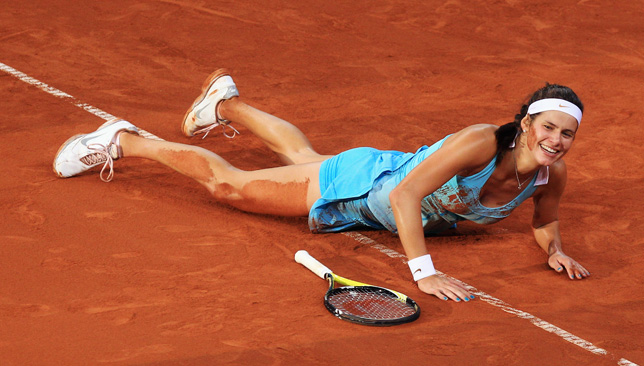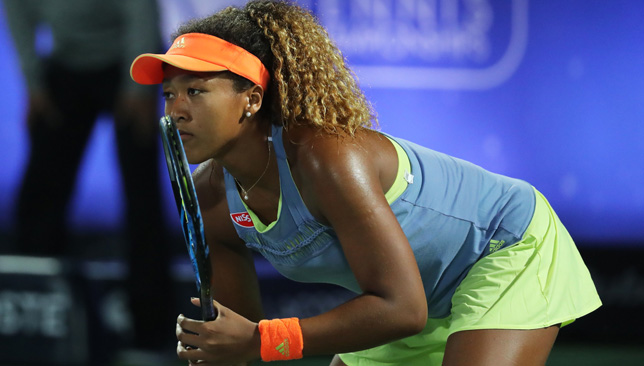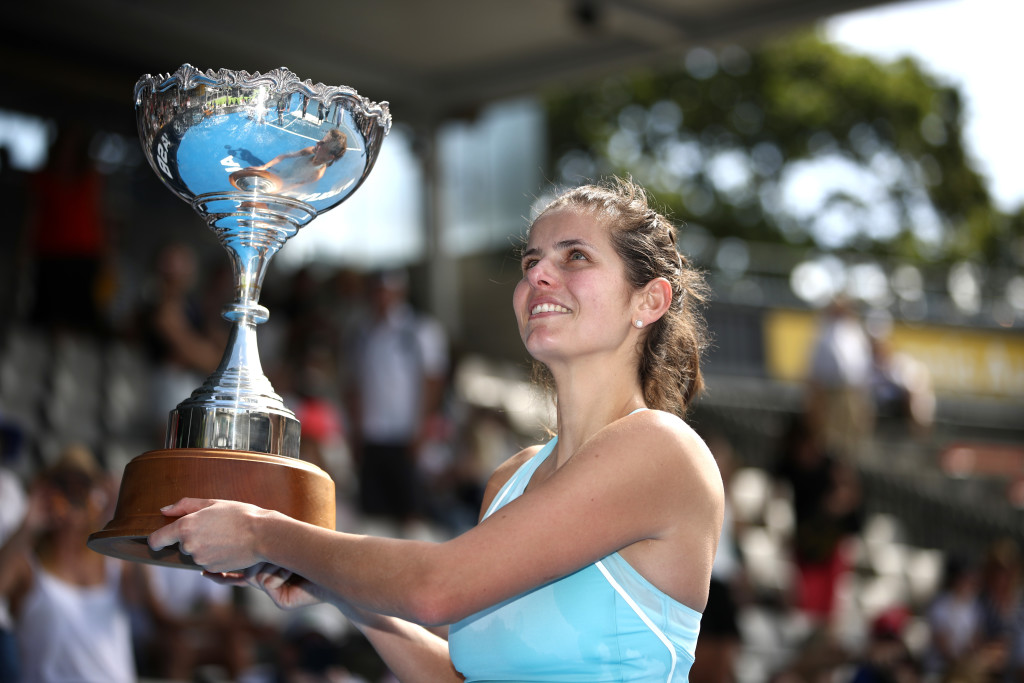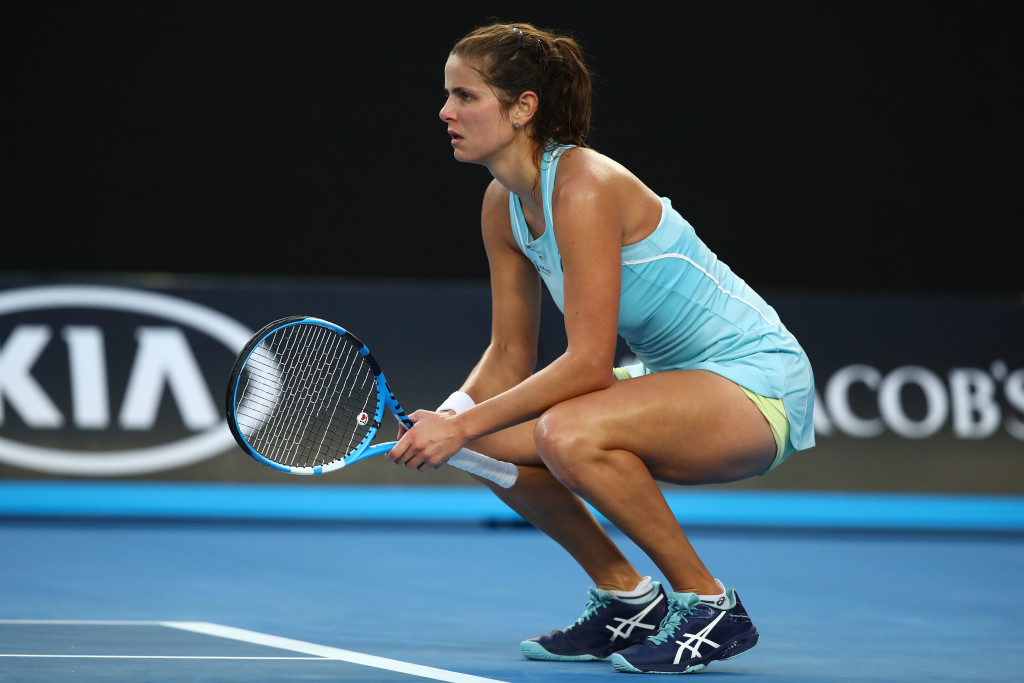
Seven years ago, a 22-year-old Julia Goerges, ranked No. 32 in the world at the time, defeated three top-10 players – Victoria Azarenka, Sam Stosur and Caroline Wozniacki – en route to the Stuttgart title.
It was a breakout moment for the big-hitting German on home soil but it took her another six years to add more silverware to her trophy cabinet.
It was a long road back, but a coaching change, a shift in mentality, adjustments to her serve and some renewed confidence eventually saw Goerges finally snap her title drought, in Moscow last October.
That sparked a three-tournament, 15-match winning streak as Goerges ended 2017 claiming nine victories in a row (lifting trophies in Moscow and Zhuhai) and started 2018 unbeaten in six consecutive clashes to reign supreme in Auckland.
Goerges’ reward was a top-10 berth for the first time in her career (on February 5, 2018).

Naomi Osaka interview: Young Japanese star coming out of her shell and looking to make her move
The 29-year-old has made seven finals in the last 10 months – including a runner-up showing in Charleston less than a fortnight ago, and she enters next week’s Porsche Tennis Grand Prix in Stuttgart (starts Monday) as a real contender for the title.
That magical run in Stuttgart in 2011 still occupies a special place in Goerges’ heart “but I was still a different me,” she told Sport360 in an interview in Indian Wells last month.
“Probably Moscow (is my favourite career moment), that was my most emotional one I guess.”
So what’s so different between the Julia of Stuttgart in 2011 and the Julia of now?
“(In Stuttgart) I was there at the right place at the right time, playing the right tennis, but it has nothing to do with my tennis right now, and also not with my physical part,” she explains.
Indeed Goerges has evolved tremendously, particular over the past couple of seasons.
She started 2016 with a new team, ending her seven-year partnership with coach Sascha Nensel and hiring Michael Geserer and Matthias Mischka.
Goerges, Geserer and Mischka all live within a kilometre of each other in Regensburg, near Munich, and have formed a formidable team that is behind the German’s surge.
While her serve has always been a weapon, Goerges made improvements to the shot and is currently the WTA tour’s ace leader with 153 struck in 23 matches so far this season – that’s 34 more than what ‘ace queen’ Karolina Pliskova has managed in 2018.
Goerges and Pliskova played doubles together for most of the 2016 season and qualified for the WTA Finals in Singapore as a team that year.
Competing in doubles alongside Pliskova, a former US Open runner-up who reached the No. 1 ranking last season, is one of the reasons that eventually led to Goerges stepping up in 2017.
Asked why she thinks things have fallen into place for her now, at 29, Goerges said: “Probably because I haven’t done the right things (in the past).
“I thought maybe I have done the right things and I have been working hard but when you don’t know better… and maybe people have different philosophies about things which maybe suit you better, then those results will come.
“I think every athlete is not very patient. I started to be patient because my coach always told me ‘wait, you will see, it’s going to come, we keep on working but be patient, don’t worry’.
“So it was very important for example to start playing a lot of doubles matches to get a lot of training in but also at the same time to really practice those things he wanted to see from my side so that helped me a lot as well, playing with Karolina.
“That was something to see her playing at a great level but at the same time I played a great level in doubles as well, so why can I not do it in singles? That was important for me to really move on there and then as soon as I was playing better in singles, I stepped away a bit from doubles.
“All those things I think, with hard work, and then the belief and trust that I can do it and really seeing on court that new things are happening.”
After having that strong finish to 2017, winning Moscow and Zhuhai back-to-back, Goerges was grateful the season was over so she could not only rest, but also take stock of everything that happened.

“This was nice for me, to have that break, to really – not think about, but also to get through it emotionally,” said Goerges. “Because I got to learn a lot of new things and sometimes it comes a lot in that moment and you don’t really think about it. But then once there’s a little break it starts to sink in and you start to think a little bit about it, which I actually like because sometimes people say ‘hey, you shouldn’t think about it that much and shouldn’t worry’, but I have always been the person to really let the things really go inside, settle them in and then it’s good. You know what you have in the bank.
“That’s how it’s been and that was nice for me to really have this start of the season as well because it gave me a lot of confidence to see that I was capable of playing this kind of tennis at the end of the season where a lot of players are maybe tired and don’t have a lot of energy, so for me it was good to see.”
Goerges credits Geserer – who is both her coach and her manager – and Mischka for her recent progress and says they’ve been a crucial part of her learning process. They’ve helped keep her “grounded” during her 15-match winning streak and keep pushing her to strive for more. That has brought great consistency to her game and results.
“I talk a lot to my team, that’s very important because they always give me a lot of good ideas how you can really manage those situations and I’ve always told myself once you’re going to have success, which I was always pretty sure about it, because I thought I still have a lot of potential in me which didn’t really show up yet, I always said ‘hey, I want to stay first of all the same person, because it’s just a number in front of my name, which doesn’t say anything about my character or person at all’. So that was for me very important that I stay very calm and very grounded and my team helped me a lot with that,” says Goerges, who many would agree is one of the nicest women on tour.
“But at the same time sometimes I also need a few days alone to really think about the emotions and also the pictures you still have in your mind, matches and points or something, that was very important for me to have a few days where maybe I looked a little bit again at some matches I played, where really I could close this chapter somehow.”
The tour has been witnessing a lot of changes recently, with young guns charging ahead, veterans hanging on and several household names taking breaks for one reason or another. Serena Williams has returned from her maternity leave to a constantly evolving landscape and Goerges believes the competition is as tough as ever.
“I think everybody has the same opportunity it’s just a matter of if you take it or not. It’s very interesting right now in women’s tennis to see every single player in the draw has a chance to win a tournament and everybody should go for it – that makes it interesting,” says the world No. 11.
“If I come to a tournament, I want to win it. Of course I don’t say it like I want to win this tournament but if I don’t want to win it, why should I be here? If I say I want to win the first round then I can retire. So it’s also about seeing those things.
“I think it’s not about – of course they are big stars, Serena, Vika (Azarenka), and everybody, they are coming back and stuff. But it’s not as easy as it’s been all the last years when you say you, hey you come back, ‘okay I’m going to win because I have this name and this name’. So it changed a lot.
“There is respect but not the respect of the name that much anymore. Everybody can beat anyone and I think that’s even better to see, hey everybody has to fight for every single point and every single match. That for me is interesting to see, when you see also at the Grand Slams that every different player can win it. It’s nice, it motivated me a lot.”
The last six majors were won by six different players (Wozniacki, Sloane Stephens, Garbine Muguruza, Jelena Ostapenko, Serena and Angelique Kerber) and it’s all to play for in this upcoming French Open.

Goerges has reached the fourth round at the Slams on five separate occasions but the quarter-final stage continues to elude her. Does she have an idea of what she has to do to change that?
“Probably not put a lot of pressure on myself. I’ve been very consistent in all the other events, I’m probably the only one who has so less points in all the mandatory events to be there around No. 12 in the world or whatever it is,” she replies.
“I should take it a little bit more relaxed in those events. Trying to really focus on all the big ones, I think that’s something I have to focus on without putting any pressure on myself.
“Just trying to do the best preparation I can do, that’s all that’s in my hands and then I can see if I could bring it on the court. But putting a lot of pressure, that never helps. Obviously you always have expectations from your own side but I think there’s always a lot of things to talk about and you always get a lot of things to your mind…
“Like for example in Australia they were telling me I was on a winning streak of 15 matches… yeah it’s nice to write but it doesn’t help me, it doesn’t give me extra points, extra money or it doesn’t give me No. 1 in the rankings. Who the **** cares? I didn’t care.
“There are always things coming to you and you try to move them on the side. And I think I’ve learned a lot out of that kind of lesson, media lesson maybe. That’s something I want to improve at the big tournaments, to really go for it but in a normal way.”
Having started her clay season with a final showing in Charleston, who knows, maybe that major breakthrough is just around the corner for the ever-dangerous Goerges!